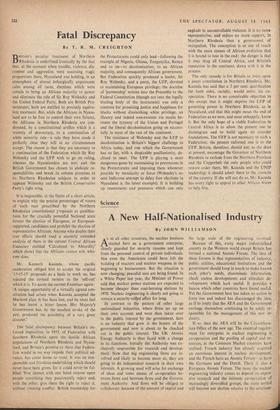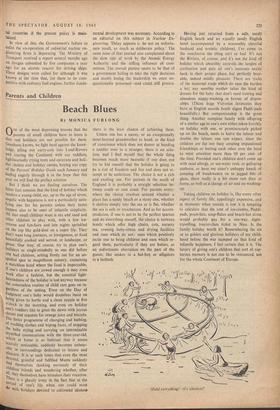Science
A New Half-Nationalised Industry
By JOHN WILLIAMSON Ain all other countries, the nuclear business started here as a government enterprise, closely guarded for security reasons and kept from the personal control of private individuals. Not even the Americans could have left the building of reactors and nuclear weapons in the beginning to businessmen. But the situation is now changing; peaceful uses are being found. In a White Paper last year, the Minister of Power said that nuclear power stations are expected to become cheaper than coal-burning stations by 1970. Nuclear engineering is clearly not going to remain a security-stifled affair for long.
In contrast to the pattern of other large nationalised industries, where firms set up on their own account and were then taken over in the public interest by the government, here is an industry that grew in the bosom of the government and now is about to be chucked out in the public interest. The UK Atomic Energy Authority is thus faced with a change in its functions. Initially the Authority was ex- clusively responsible for research and develop- ment. Now that big engineering firms are in- volved and likely to become more so, they are going to do independent research in their own interests. A growing need will arise for exchange of ideas and some means of co-operation be- tween firms and between firms and the Govern- ment Authority. And firms will be obliged to collaborate, because of the amount of capital and the large scale of the engineering involved.
Because of this, every major industrialised country in the Western world except Britain has formed a national Atomic Forum. The idea of these forums is that representatives of industry, public utilities, educational institutions and the government should keep in touch to make known each other's needs, disseminate information, check useless developments and stimulate de- velopments which look useful. It provides a liaison which other countries have found useful. Yet the Government here has taken no action to form one and indeed has discouraged the idea, as if to imply that the AEA and the Government envisage themselves continuing to be solely re- sponsible for the management of this new in- dustry.
If so, then the AEA will be the Circumlocu- tion Oflice of the new age. The essential require- ment for enterprise in nuclear engineering is co-operation and the pooling of capital and re- sources, as the Common Market countries have realised. French industry has already acquired an enormous interest in nuclear development, and the French have an Atomic Forum– as have the Germans and the Dutch. There is also a European Atomic Forum. The more the nuclear engineering industry comes to depend on expen- sive research and the intimate co-operation of increasingly diversified groups, the more settled wi,11 become our decline relative to the continen- tal countries if the present policy is main- tained.
In view of this, the Government's failure to enlist the co-operation of industrial nuclear en- gineering firms is depressing The Ministry of Transport received a report several months ago on designs submitted by five companies a year ago for an atomic reactor for driving ships. These designs were called for although it was known at the time that, for them to be com- petitive with ordinary fuel engines, further funda- mental development was necessary. According to an editorial on this subject in Nuclear En- gineering, 'Delay appears tL be not an unfortu- nate result, so much as deliberate policy.' The same issue of that journal also complained about the slow rate of work by the Atomic Energy Authority and the stifling influence of com- mittees. The overall picture seems to be that of a government failing to take the right decisions and slowly losing the leadership we once un- questionably possessed—and could still possess.































 Previous page
Previous page